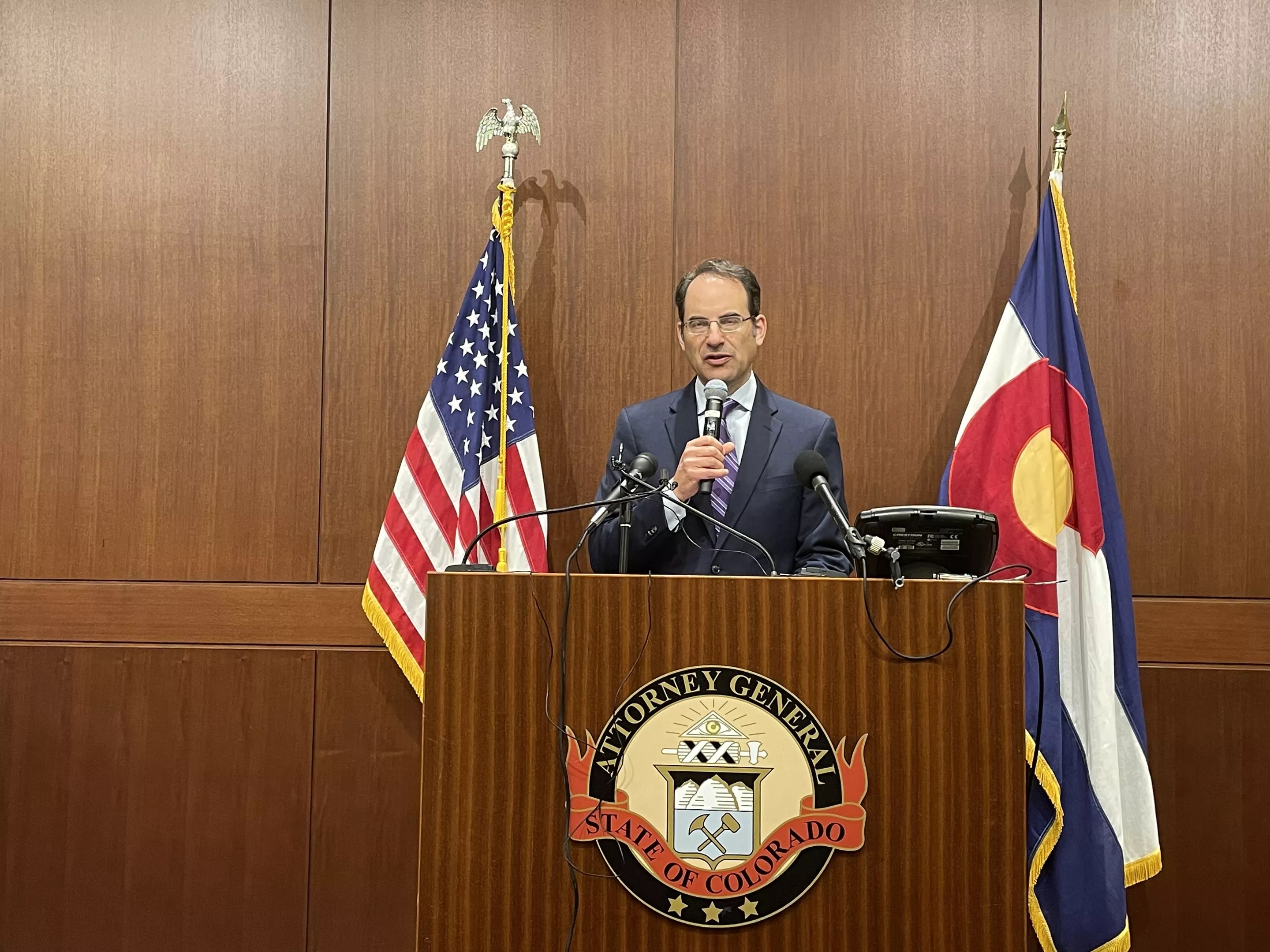
Alliance Defending Freedom

Audio By Carbonatix
With a 6-3 split down ideological lines, the Supreme Court of the United States ruled that the First Amendment allows religious owners of creative businesses to refuse to serve same-sex couples.
“The First Amendment envisions the United States as a rich and complex place where all persons are free to think and speak as they wish, not as the government mandates,” Justice Neil Gorsuch wrote in the majority opinion released today, June 30. “Because Colorado seeks to deny that promise, judgment is reversed.”
The case, 303 Creative v. Elenis, was brought because a Colorado web designer named Lorie Smith did not want to comply with the Colorado Anti-Discrimination Act (CADA), which prohibits businesses open to the public from discriminating based on various characteristics, including sexual orientation.
Smith, with the help of Christian-rights law firm Alliance Defending Freedom (ADF), had sued the State of Colorado – including Aubrey Elenis, director of the Colorado Civil Rights Division – in U.S. District Court in 2016. She asked the court to allow her to offer her wedding website design services to straight couples only, and to post a message on her website describing her religious objection to same-sex marriage as the reason.
She had yet to be asked to make a website for any same-sex couple, but simply claimed that Colorado’s anti-discrimination law is unconstitutional. The state argued that the case should be dismissed because there was no actual instance of Smith being asked to express something she didn’t believe, and the court ruled for the state.
Smith appealed that decision, but the U.S. Court of Appeals for the 10th Circuit agreed with the district court that CADA did not violate the First Amendment. Smith and her attorneys then took her case to the U.S. Supreme Court, which ruled in favor of Smith.
“This Court has also long recognized that no public accommodations law is immune from the demands of the Constitution,” Gorsuch wrote. “Countless other creative professionals, too, could be forced to choose between remaining silent, producing speech that violates their beliefs, or speaking their minds and incurring sanctions for doing so.”
But local LGBTQ+ advocates warn that the Supreme Court’s decision doesn’t affirm religious freedom or freedom of expression, but rather affirms discrimination against people based on sexuality.
“For fifty years, settled law and common decency said that when a business opens its doors to the public, that business should be open to all, a core principle that is at the heart of how we treat one another,” Rex Fuller, executive director of LGBTQ+ resource nonprofit The Center on Colfax, said at a June 30 press conference called to discuss the decision. “Today, the court said that doesn’t matter anymore.”
In her dissent, Justice Sonia Sotomayor argued that for the first time in its history, the court had declared that a business has a constitutional right to refuse to serve members of a protected class.
“The opinion of the Court is, quite literally, a notice that reads: ‘Some services may be denied to same-sex couples,'” Sotomayor wrote. “It sends the message that we live in a society with social castes. It says to the child of the same-sex couple that their parents’ relationship is not equal to others. And it reminds LGBT people of a painful feeling that they know all too well: There are some public places where they can be themselves, and some where they cannot.”
Smith disagrees.
“I’m incredibly grateful for the U.S. Supreme Court’s ruling, which says I am free to create art consistent with my beliefs without fear of Colorado punishing me,” she said in a statement released by the ADF.
According to Colorado Attorney General Phil Weiser, whose office organized the June 30 press conference, the state isn’t seeking to punish but simply to affirm that businesses should be open to all, even businesses that are creative and expressive. The effects of the Supreme Court’s decision could go past just wedding website design by Christians for same-sex couples.
“A business could refuse to serve an interracial couple claiming that interracial marriage is wrong,” he said. “It means a payroll company or a photographer could say, ‘I don’t want to do business with women-owned businesses because I don’t believe women should be working outside the home.’ It means a bookseller of religious texts could say, ‘I’m not going to sell books to a member of the Church of Jesus Christ of Latter-day Saints because I don’t believe that it’s a legitimate religion.'”
This isn’t the first time a Colorado business owner has tried to refuse service to gay people because of Christian beliefs. Jack Phillips, owner of Lakewood’s Masterpiece Cakeshop, wouldn’t bake a cake for a gay couple in 2012. The Supreme Court ended up determining that Colorado had acted in a hostile manner toward Phillips over his beliefs when it ruled in his favor in 2018 in Masterpiece Cakeshop v. the Colorado Civil Rights Commission.
Phillips was also represented by ADF – but unlike Smith, he had actually been asked to serve a gay couple. (The New Republic just reported that a claim that Smith had been asked to design a website for a gay couple – only added after she filed her original lawsuit – is likely false.) Weiser discussed that problem with Smith’s case at the press conference, noting that the state’s position has always been that there is no website design and no operational business.
Without an example of real people being harmed by Smith’s actions, he continued, the court didn’t have to struggle with who would suffer based on the outcome of its decision.

Attorney General Phil Weiser plans to limit the reach of the court’s decision in Colorado.
Catie Cheshire
“This case was never about weddings or websites,” said Nadine Bridges, executive director of LBGTQ+ advocacy organization One Colorado. “It was deliberately fabricated to undermine the civil rights laws that protect all of us from discrimination.”
Bridges and others at the press conference hammered home the point that it’s not just LGBTQ+ people who will be impacted, but that the case leaves other marginalized groups open to discrimination by so-called expressive businesses.
“This decision allows us to bask in the weakness of our biases, our fears, our ignorance, rather than confront them,” said Shara Smith, director of the Interfaith Alliance of Colorado. “It allows a lesser version of ourselves to go unchallenged and calls it free speech. For members of communities that have historically been targeted, whether based on sexual orientation, race, ethnicity, faith or other factors, we know all too well what it means to be told, ‘We don’t serve your kind here.'”
Weiser and others at today’s gathering asked businesses in the state to openly reject the court’s line of thinking and affirm that they will serve everyone.
“We call on all fair-minded businesses and owners to condemn discrimination and continue their long-standing commitments to treat everyone with dignity and respect,” Bridges said.
It was infuriating that the decision came on the last day of Pride month, Fuller noted. This year’s Denver Pride theme was “Be proud out loud,” and he encouraged everyone to continue to be proud and stand up for those who are attacked for who they are and who they love.
According to Weiser, the court’s decision doesn’t mean the state must change its anti-discrimination law, but does create a loophole in it for businesses that are expressive.
His office will work to be sure that loophole is as small as possible.
“This case is an invitation to more litigation and mischief because it invites businesses to say, whoever they are, that they have this expressive interest that creates a loophole,” he said. “We don’t yet know how broad that loophole will be or what qualifies.”
Weiser added – several times – that his office would like to see the decision overturned. In the meantime, he said he hopes that communities in Colorado will come together to reject discrimination.
“The response here, about who we are and about the work we do together, is the message that I’m going to focus on,” he said. “As we close our Pride month, as we approach July Fourth, we cannot let this opinion – which is wrongly decided and ultimately will and must be overturned – define us. We define us. We stand for our values. And we stand together.”